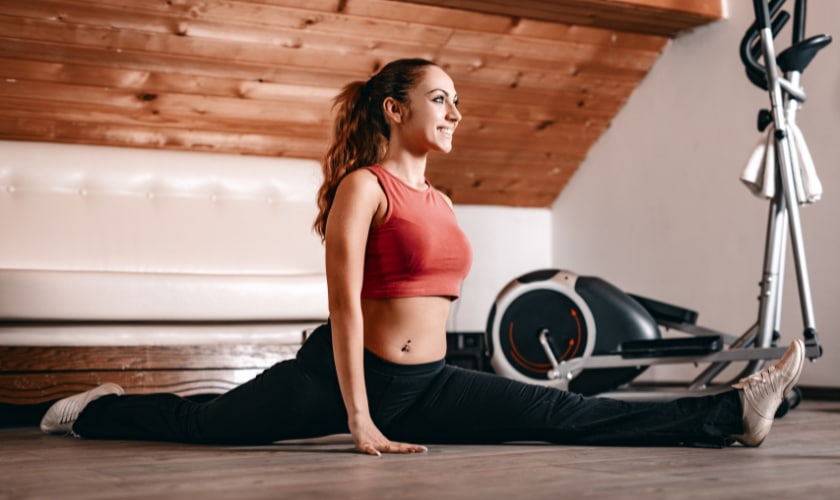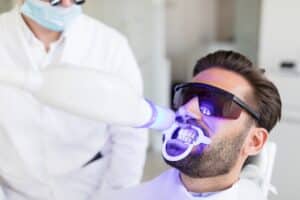Are you a fitness enthusiast who keeps up with the latest trends in workouts and health regimes? Do you often engage in high-impact activities that involve crunches, lifting weights, or even boxing? While exercise is essential for your overall well-being, have you ever thought about how it can impact your dental health? That’s right! Your teeth are just as important as any other part of your body. In this blog post, we’ll share some tips on how to protect your teeth during your fitness routine. From brushing techniques to mouthguard options, we’ve got you covered! So let’s dive in and discover how to keep those pearly whites shining through every squat jump and kickboxing session.
Proper Oral Hygiene During Exercise
When you’re working out, it’s important to take care of your teeth and gums just like the rest of your body. Here are a few tips on how to maintain proper oral hygiene during exercise:
1. Rinse your mouth with water before and after exercising. This will help remove any bacteria or food particles that could lead to cavities or gum disease.
2. If you’re working out in a hot environment, be sure to drink plenty of water to avoid dehydration. Dehydration can reduce saliva production, which increases the risk of cavities and gum disease.
3. Avoid sugary drinks before or during exercise, as the sugar can stick to your teeth and cause cavities. If you must have a sugary drink, brush your teeth afterward to remove the sugar from your teeth.
4. Don’t chew gum while exercising, as this can increase the risk of tooth decay. Gum also often contains sugar, which can lead to cavities if it’s not removed from your teeth after exercise.
5. Be sure to visit your dentist regularly for professional cleanings and checkups. This will help ensure that your teeth and gums stay healthy, even if you are exercising regularly
Tips for Protecting Teeth During Exercise
When you’re working out, it’s important to protect your teeth just as much as the rest of your body. Here are a few tips on how to do so:
1. Wear a mouthguard.
If you play any contact sports, you should be wearing a mouthguard to protect your teeth from impact. Even if you don’t play sports, wearing a mouthguard while you work out can help protect your teeth from grinding or clenching.
2. Avoid sugary drinks.
Sugary drinks are one of the main causes of tooth decay. When you’re working out, it’s important to stay hydrated, but make sure to avoid sugary sports drinks and stick to water instead.
3. Don’t chew on hard objects.
Chewing on hard objects like straws or pens can damage your tooth enamel and lead to tooth decay. If you need something to chew on while you work out, opt for sugar-free gum instead.
What Foods to Eat Before and After Working Out?
Working out is great for your overall health, but it’s important to take care of your teeth during and after your workout. Here are some tips on how to protect your teeth while you get fit:
Before working out, eat foods that are high in water content or have fluoride. This will help to keep your mouth moist and reduce the risk of tooth decay. Good options include raw fruits and vegetables, yogurt, cheese, and milk.
After working out, brush your teeth with fluoride toothpaste to remove any bacteria that may have built up during your workout. It’s also a good idea to floss to remove any food particles that may be stuck between your teeth.
Mouthguards: Should You Wear One When Exercising?
When it comes to working out, we often focus on protecting our bodies from injury. But what about our teeth?
Mouthguards can help protect your teeth from being damaged or knocked out during physical activity. They can also help reduce the risk of concussions and other head injuries.
There are a few things to consider when choosing a mouthguard:
Size: Make sure the mouthguard fits snugly and comfortably. It should not be too loose or too tight.
Material: Mouthguards are typically made of latex, silicone, or vinyl. Latex is the most comfortable but can cause allergic reactions in some people. Silicone is less likely to cause allergies but may not be as comfortable. Vinyl is the least expensive option but may not provide as much protection.
Thickness: Thin mouthguards offer less protection than thick ones. Choose a thickness that provides adequate protection without making it difficult to breathe or speak.
If you wear braces, you will need to get a custom-made mouthguard that fits over your braces. You should also avoid chewing on your mouthguard, as this can damage your braces.
The Benefits of Regular Dental Checkups
It’s important to take care of your teeth, especially if you’re active in a fitness routine. Regular dental checkups can help prevent tooth decay and gum disease, and they can also help you keep your smile looking its best. Here are some of the benefits of regular dental checkups:
1. Prevent tooth decay and gum disease: Dental checkups can help identify problems early before they become more serious. This means that you can get treated for tooth decay or gum disease before it becomes a bigger problem.
2. Keep your smile looking its best: A bright, healthy smile is important to your overall appearance. Regular dental checkups can help ensure that your teeth are healthy and looking their best.
3. Save money: Dental problems can be expensive to treat, so it’s important to catch them early. By getting regular dental checkups, you can save money on treatment in the long run.
4. Avoid pain: Dental problems can cause pain, so it’s important to get them treated as soon as possible. Regular dental checkups can help you avoid pain by identifying problems early and getting them treated quickly.
Conclusion
Taking proper care of your teeth during a workout is essential for both your oral and overall health. From choosing the right foods to brush before you exercise, there are many ways to make sure that you keep your teeth healthy and strong. With these tips in mind, you can better protect your teeth from damage while getting fit and having fun!
FAQs
Yes, you can brush your teeth immediately after a workout. However, it is important to wait 30 minutes to an hour before brushing your teeth if you have consumed any acidic drinks during your workout, as this can damage the enamel on your teeth.
It is generally recommended to floss before brushing your teeth, as this helps to remove any food particles or plaque that may be stuck between your teeth. However, if you prefer to brush your teeth first, that is also fine. Just be sure to floss at some point during your daily dental routine!
Mouthwash is not necessary for everyone, but if you feel like you need it, then go ahead and use it after brushing your teeth. Some people find that mouthwash helps to freshen their breath and remove any lingering bacteria in their mouths.





